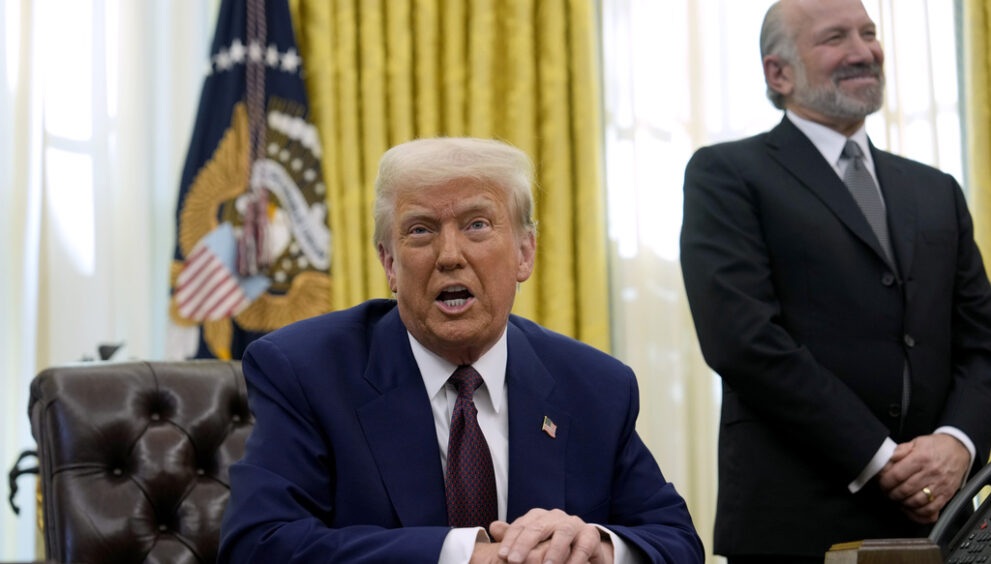Trump Utilizes US Trade Leverage to Benefit American Workers

Recent imposition of tariffs on goods from Mexico, Canada, and Colombia are not considered trade wars, but rather a reaction to various political concerns such as illegal immigration, Fentanyl, cartels, and crime. The Trump administration is demonstrating its commitment to using trade as a tool to support domestic policy objectives.
This strategy has proven effective so far: Colombia and Mexico complied with President Trump’s demands following his threat of imposing tariffs. However, the dispute between the United States and the European Union primarily revolves around trade, which is a significant aspect.
According to Daniel Hamilton from Brookings, the trade in goods and services between the US and EU is nearly double that of the US-China trade. Furthermore, revenues generated from foreign affiliates of the US and EU, including American and European-controlled companies operating abroad, are significantly higher compared to US-Canada-Mexico affiliates and far surpass US-China investments, which face restrictions from Washington and Beijing.
The existing trade relationship with Europe is severely fractured, and ordinary Americans are bearing the brunt. Over a decade ago, it was acknowledged by the Obama administration that the EU’s trade policies adversely impact US farmers, ranchers, manufacturers, workers, and their families. The situation has only worsened, with the EU’s aggressive environmental, social, and governance (ESG) agenda unfairly affecting US oil and gas workers.
European tariffs on American-made automobiles are four times higher than what the US imposes on European auto exports. Similarly, the EU imposes higher duties on food, beverages, and other agricultural products. Moreover, European Union nations impose a 21.6 percent value-added tax (VAT) on goods and services, resulting in American products sold in Europe being taxed at rates exceeding 30 percent.
President Trump has condemned the EU’s trade policies as an “atrocity” and has recently announced the pursuit of reciprocal trade. This sensible approach asserts that American-made products sold in Europe should be taxed equivalently to European-produced items sold in the US.
However, there is room for further action on EU trade by the Trump administration. Europe’s substantial reliance on Russian natural gas imports is concerning. Consequently, lifting the Biden administration’s ban on new liquefied natural gas (LNG) export permits marks a step in the right direction. Trump’s energy advisors should encourage their European counterparts to participate in a multilateral energy summit in Houston, featuring a tour of LNG terminals.
Efficient transatlantic energy diplomacy also translates into favorable domestic policy outcomes. A study by S&P Global co-authored by energy analyst Daniel Yergin indicates that increased LNG exports could generate nearly 500,000 high-quality jobs in the US, predominantly in blue-collar industries like construction and manufacturing that have been negatively impacted by ESG policies targeting the working class.
Real disposable income per capita has risen considerably more in the US than in Europe since 2000. Encouragingly, Europe appears to be reconsidering its stringent regulations that contributed to the continent’s productivity crisis. The EU’s introduction of a new policy framework, known as the “Competitiveness Compass,” could pave the way for scaling back some of its most aggressive measures. This includes the EU’s climate disclosure norms, part of the European Green Deal, enforcing US companies operating in the EU to align their supply chains with global climate objectives.
Trump should acknowledge Brussels’ willingness to reform and advocate for broad deregulation in the European market while curbing green energy subsidies domestically. The Biden administration’s lavish subsidies for renewable energy firms disproportionately burdened lower-income Americans, leading to surging electricity bills and stagnation in the job market.
Given Europe’s dependence on US exports, Trump’s use of trade as leverage is strategic. However, the ultimate intention should not be protectionism. Prioritizing trade reciprocity, adopting an energy-realistic approach, and easing regulations on both sides of the Atlantic will play a more substantial role in supporting American workers.
Michael Toth, a resident fellow at the Foundation on Equal Opportunity and a founding partner of PNT Law in Austin, Texas, contributed to this piece.






















































































































































































































































































































































































































































































































































































































































































































































































































































































































































































































































































































































































































































































































































































































































































































































































































































































































































































































































































































































































































































































































































































































































































































































































































































































































































































































































































































































